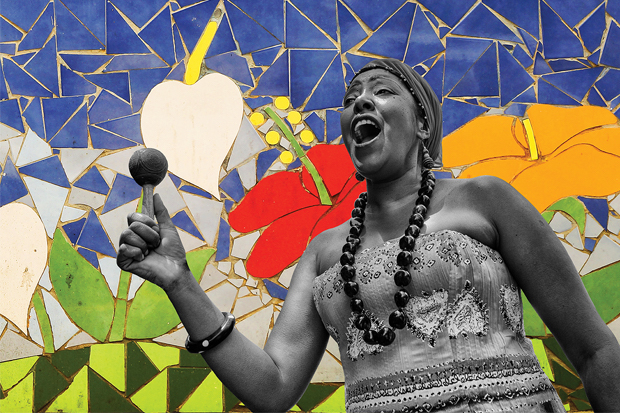MusicUnitesUS presents: Betsayda Machado - The Voice of Venezuela

Betsayda Machado
The MusicUnitesUS world music residency runs March 2 to March 7 at Brandeis. A concert will be held March 7 in Slosberg Recital Hall. Tickets can be purchased online or by calling (781) 736-3400. This article, written by music lecturer Benjamin Paulding, originally appeared in the spring 2020 issue of State of the Arts.
Across much of West Africa, traditional music often consists of three elements: drumming, dancing and singing. African people utilize these elements to express individual and community sentiments, embody history and culture. Through their music, they create feelings of joy, togetherness, and transcendence of the routines of everyday life.
When Africans were violently uprooted during the transatlantic slave trade and forcibly relocated to the Americas, one unintended consequence was the geographic transmission of African musical aesthetics. African music often blended with European instruments: for example, the fusion of African rhythms and European military band drums that is found in Brazilian samba and maracatu styles. In the United States, African-descended slaves were banned from drumming (one notable exception being Congo Square in the city of New Orleans), but African musical aesthetics like the call-and-response vocal form persevered and found its way into popular music, such as in the chorus of James Brown's “Say It Loud – I’m Black and I’m Proud."
In Venezuela, there is a long and rich history of African slaves winning their independence early and establishing sovereign communities that were free to practice African-inspired language and culture. Afro Venezuelan music, therefore, sounds and looks remarkably similar to its West African musical relatives, retaining the drum ensemble’s tightly interlocking rhythms as well as the virtuosic, undiluted call and response form of the vocalists. It’s a music that’s been described as danceable poetry: gutsy, joyful and vital.
One of the most celebrated Afro Venezuelan performers in the world today is Betsayda Machado, whose music is said to make dancers float. She and her ensemble will be in residence at Brandeis March 2 to 7 for a week of music and dance and open conversations on race, gender, diaspora and tradition.
Felix Contreras, co-creator and host of “Alt.Latino,” National Public Radio’s Latin alternative music and Latino culture program, describes Machado’s vocals as “a choir-like display of African call-and-response.” You can get a taste of this musical power in the Tiny Desk Concert performance, archived online, that the ensemble recorded for NPR in 2018. But there’s nothing like the real thing, and I hope you’ll join us in March for the remarkable experience of live music and conversation with Betsayda Machado.
Categories: Arts





